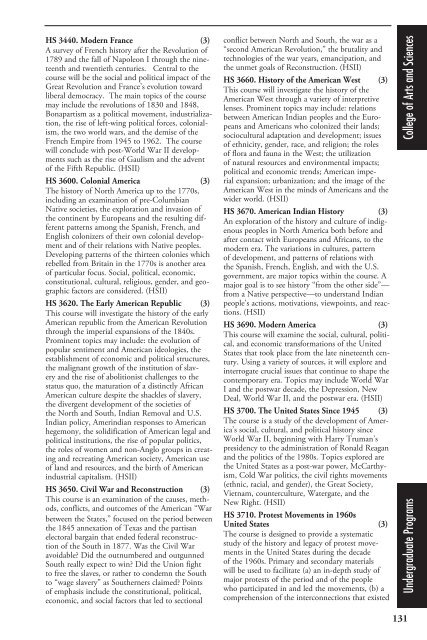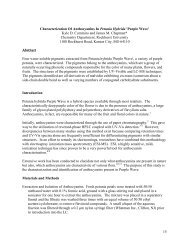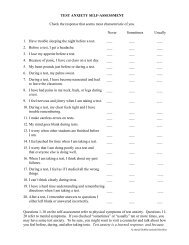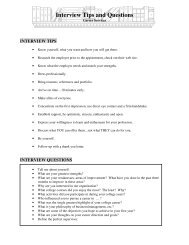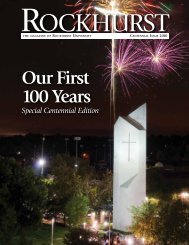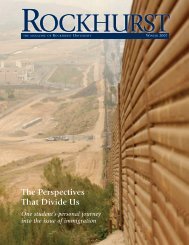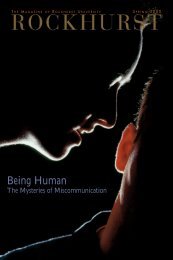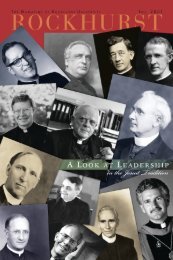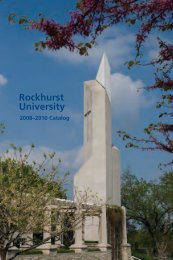RockhuRst univeRsity 2012â2014 catalog
RockhuRst univeRsity 2012â2014 catalog
RockhuRst univeRsity 2012â2014 catalog
- No tags were found...
You also want an ePaper? Increase the reach of your titles
YUMPU automatically turns print PDFs into web optimized ePapers that Google loves.
HS 3440. Modern France (3)A survey of French history after the Revolution of1789 and the fall of Napoleon I through the nineteenthand twentieth centuries. Central to thecourse will be the social and political impact of theGreat Revolution and France’s evolution towardliberal democracy. The main topics of the coursemay include the revolutions of 1830 and 1848,Bonapartism as a political movement, industrialization,the rise of left-wing political forces, colonialism,the two world wars, and the demise of theFrench Empire from 1945 to 1962. The coursewill conclude with post-World War II developmentssuch as the rise of Gaulism and the adventof the Fifth Republic. (HSII)HS 3600. Colonial America (3)The history of North America up to the 1770s,including an examination of pre-ColumbianNative societies, the exploration and invasion ofthe continent by Europeans and the resulting differentpatterns among the Spanish, French, andEnglish colonizers of their own colonial developmentand of their relations with Native peoples.Developing patterns of the thirteen colonies whichrebelled from Britain in the 1770s is another areaof particular focus. Social, political, economic,constitutional, cultural, religious, gender, and geographicfactors are considered. (HSII)HS 3620. The Early American Republic (3)This course will investigate the history of the earlyAmerican republic from the American Revolutionthrough the imperial expansions of the 1840s.Prominent topics may include: the evolution ofpopular sentiment and American ideologies, theestablishment of economic and political structures,the malignant growth of the institution of slaveryand the rise of abolitionist challenges to thestatus quo, the maturation of a distinctly AfricanAmerican culture despite the shackles of slavery,the divergent development of the societies ofthe North and South, Indian Removal and U.S.Indian policy, Amerindian responses to Americanhegemony, the solidification of American legal andpolitical institutions, the rise of popular politics,the roles of women and non-Anglo groups in creatingand recreating American society, American useof land and resources, and the birth of Americanindustrial capitalism. (HSII)HS 3650. Civil War and Reconstruction (3)This course is an examination of the causes, methods,conflicts, and outcomes of the American “Warbetween the States,” focused on the period betweenthe 1845 annexation of Texas and the partisanelectoral bargain that ended federal reconstructionof the South in 1877. Was the Civil Waravoidable? Did the outnumbered and outgunnedSouth really expect to win? Did the Union fightto free the slaves, or rather to condemn the Southto “wage slavery” as Southerners claimed? Pointsof emphasis include the constitutional, political,economic, and social factors that led to sectionalconflict between North and South, the war as a“second American Revolution,” the brutality andtechnologies of the war years, emancipation, andthe unmet goals of Reconstruction. (HSII)HS 3660. History of the American West (3)This course will investigate the history of theAmerican West through a variety of interpretivelenses. Prominent topics may include: relationsbetween American Indian peoples and the Europeansand Americans who colonized their lands;sociocultural adaptation and development; issuesof ethnicity, gender, race, and religion; the rolesof flora and fauna in the West; the utilizationof natural resources and environmental impacts;political and economic trends; American imperialexpansion; urbanization; and the image of theAmerican West in the minds of Americans and thewider world. (HSII)HS 3670. American Indian History (3)An exploration of the history and culture of indigenouspeoples in North America both before andafter contact with Europeans and Africans, to themodern era. The variations in cultures, patternof development, and patterns of relations withthe Spanish, French, English, and with the U.S.government, are major topics within the course. Amajor goal is to see history “from the other side”—from a Native perspective—to understand Indianpeople’s actions, motivations, viewpoints, and reactions.(HSII)HS 3690. Modern America (3)This course will examine the social, cultural, political,and economic transformations of the UnitedStates that took place from the late nineteenth century.Using a variety of sources, it will explore andinterrogate crucial issues that continue to shape thecontemporary era. Topics may include World WarI and the postwar decade, the Depression, NewDeal, World War II, and the postwar era. (HSII)HS 3700. The United States Since 1945 (3)The course is a study of the development of America’ssocial, cultural, and political history sinceWorld War II, beginning with Harry Truman’spresidency to the administration of Ronald Reaganand the politics of the 1980s. Topics explored arethe United States as a post-war power, McCarthyism,Cold War politics, the civil rights movements(ethnic, racial, and gender), the Great Society,Vietnam, counterculture, Watergate, and theNew Right. (HSII)HS 3710. Protest Movements in 1960sUnited States (3)The course is designed to provide a systematicstudy of the history and legacy of protest movementsin the United States during the decadeof the 1960s. Primary and secondary materialswill be used to facilitate (a) an in-depth study ofmajor protests of the period and of the peoplewho participated in and led the movements, (b) acomprehension of the interconnections that existedUndergraduate College of Arts Programs & SciencesCollege of Arts and Sciences131


